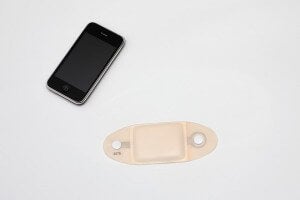

Clinical trails have begun for Sensium, a wireless body monitoring system that “monitors multiple vital signs, including skin temperature, heart rate and respiration.” Basically, Sensium is a “disposable digital plaster,” or Band-Aid-like patch, that is applied to a patient’s body. The patch contains a power source and sensors inside it that track a patient’s health and sends the gathered data to the doctor’s PDA or smartphone. Sensium is being described as cheap, disposable, long-lasting, intelligent, and efficient way for doctors to keep track of the patient’s health. What differentiates this product from the current way of monitoring patients is that it allows patients to be much more mobile and free to move around the hospital (compared to the bulky, expensive, and wired methods of today). Check out the full press release after the break.
[Via Engadget; SingularityHub]
Landmark Clinical Trial of Sensium™ Wireless Body Monitoring System
November 2, 2009: Toumaz Holdings (AIM:TMZ) is pleased to announce it has begun clinical trials of its Sensium™ “digital plaster” wireless body monitoring system at St Mary’s Hospital, London (part of Imperial College Healthcare NHS Trust). The ultra-low power body-worn Sensium™ digital plaster continuously monitors multiple vital signs, including skin temperature, heart rate and respiration. Once trials are completed in Q1 2010, the disposable digital plaster is expected to receive CE accreditation enabling commercial sales in Europe. Trials in US hospitals will commence in H1 2010.
In the milestone trial, which is sponsored by CareFusion Corporation (NYSE: CFN and a member of the S&P 500 Index), volunteers and patient groups will be provided with the Sensium™ digital plaster and as a wireless, unobtrusive and disposable device patients can remain mobile while multiple vital signs are continuously monitored. The trial will compare the quality of physiological data within a clinical setting acquired by the digital plaster system with data from current monitors in use at hospitals that are typically bulky, expensive and wired.
The digital plaster is based on new generation Sensium™ wireless technology, designed and developed by Toumaz Technology Limited, a wholly owned subsidiary of the Group, that provides a complete infrastructure to allow healthcare providers to non-intrusively monitor the human body continuously, wirelessly and intelligently and at low-cost. Sensium™ delivers clinical-quality data and intelligently integrates it into an electronic medical record via a network built on the Group’s power-optimised wireless operating and network sensor system Nano Sensor Protocol (NSP). The digital plaster is initially targeted for use in healthcare monitoring applications such as acute care, general ward environments, telecare and chronic disease monitoring, as well as care home settings.
The trials at St Mary’s Hospital, led by Consultant in Intensive Care Medicine at Imperial College Healthcare NHS Trust Dr Stephen Brett, are being conducted in three phases; the initial phase with non-patient volunteers followed by two patient study groups: patients recovering from surgery, and patients with specific medical conditions in the general wards. Initial results are expected by end-December 2009.
Dr Stephen Brett, Consultant in Intensive Care Medicine at Imperial College London, commented:
“This technology has the potential to improve the capturing of patient’s vital signs within all areas of the hospital – enabling key physiological data to be acquired at an increased frequency, with the minimum of inconvenience to patients, and without the requirement to connect patients to immobile pieces of equipment. This raises the possibility of technology improving hospital safety systems enhancing the efficiency of adding vital sign data to patient records and potentially freeing valuable nursing staff time for other patient care responsibilities.”
Professor Chris Toumazou, chief executive officer of Toumaz Holdings, commented:
“It is fantastic to see the Sensium™ technology coming to fruition, and for us to be launching this study at Imperial College Healthcare NHS Trust. This is a key stage in our commercial journey and one that opens the door to some very exciting applications of our technology in clinical environments next year.
“The business case is simple: by using the disposable digital plaster to monitor on a 24-7 basis, critical medical information can be monitored that would not otherwise have been detected. This preventative form of medicine will mean that less people could require intensive care in the future, saving lives and at the same time providing greater efficiencies and cost savings to the NHS. Once proven in a hospital setting then the digital plaster can be deployed in the home in the same way.”